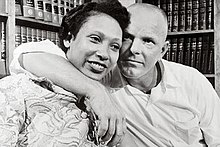
Back Mildred Loving German Mildred et Richard Loving French Mildred Loving Hungarian Mildred Loving Italian Mildred e Richard Loving Portuguese
Mildred and Richard Loving | |
|---|---|
 Mildred and Richard Loving in 1967 | |
| Born | Mildred Mildred Delores Jeter July 22, 1939 Central Point, Virginia, U.S. Richard Richard Perry Loving October 29, 1933 Central Point, Virginia, U.S. |
| Died | Mildred May 2, 2008 (aged 68) Milford, Virginia, U.S. Richard June 29, 1975 (aged 41) Caroline County, Virginia, U.S. |
| Occupation(s) | Mildred Housewife Richard Construction worker |
| Known for | Plaintiffs in Loving v. Virginia (1967) |
| Children | 3 |
Mildred Delores Loving (née Jeter; July 22, 1939 – May 2, 2008) and Richard Perry Loving (October 29, 1933 – June 29, 1975) were an American married couple who were the plaintiffs in the landmark U.S. Supreme Court case Loving v. Virginia (1967). Their marriage has been the subject of three movies, including the 2016 drama Loving, and several songs.[1][2] The Lovings were criminally charged with interracial marriage under a Virginia statute banning such marriages, and were forced to leave the state to avoid being jailed. They moved to Washington, D.C., but wanted to return to their home town. With the help of the American Civil Liberties Union (ACLU), they filed suit to overturn the law. In 1967, the Supreme Court ruled in their favor, striking down the Virginia statute and all state anti-miscegenation laws as unconstitutional, for violating due process and equal protection of the law under the Fourteenth Amendment.[3] On June 29, 1975, a drunk driver struck the Lovings' car in Caroline County, Virginia. Richard was killed in the crash, at the age of 41. Mildred lost her right eye.[4]
With the exception of a 2007 statement supporting LGBT rights, Mildred lived "a quiet, private life declining interviews and staying clear of the spotlight" after Loving and the passing of her husband.[1][2][5] On the 40th anniversary of the decision, she stated: "I am still not a political person, but I am proud that Richard's and my name is on a court case that can help reinforce the love, the commitment, the fairness, and the family that so many people, black or white, young or old, gay or straight, seek in life. I support the freedom to marry for all. That's what Loving, and loving, are all about."[2][6] Beginning in 2013, the case was cited as precedent in U.S. federal court decisions holding restrictions on same-sex marriage unconstitutional, including in the U.S. Supreme Court decision Obergefell v. Hodges (2015).[7]
- ^ a b Lopez, Tyler (February 14, 2014). "The Simple Justice of Marriage Equality in Virginia". Slate Magazine. Retrieved September 16, 2022.
The legacy of Loving v. Virginia weighs heavily on the pages of Judge Wright Allen's opinion, which opens with a quote from Mildred Loving—who was a vocal supporter of same-sex marriage—before discussing the case at hand.
- ^ a b c Holland, Brynn (October 28, 2018). "Mildred and Richard: The Love Story that Changed America". HISTORY. Retrieved September 16, 2022.
Mildred lived a quiet, private life declining interviews and staying clear of the spotlight. She did, however, make a rare exception in June of 2007. On the 40th anniversary of the Loving v. Virginia ruling... [the] devoutly religious Mildred issued a statement that read, in part, "I believe all Americans, no matter their race, no matter their sex, no matter their sexual orientation, should have that same freedom to marry. Government has no business imposing some people's religious beliefs over others. Especially if it denies people's civil rights." There is little doubt about Mildred and Richard's legacy.
- ^ Loving v. Virginia 388 U.S. 1 (1967)
- ^ Cite error: The named reference
:4was invoked but never defined (see the help page). - ^ Dominus, Susan (December 24, 2008). "The Color of Love". The New York Times. ISSN 0362-4331. Retrieved September 16, 2022.
- ^ Cite error: The named reference
:1was invoked but never defined (see the help page). - ^ Obergefell v. Hodges, No. 14-556, 576 U.S. ___ (2015)
© MMXXIII Rich X Search. We shall prevail. All rights reserved. Rich X Search